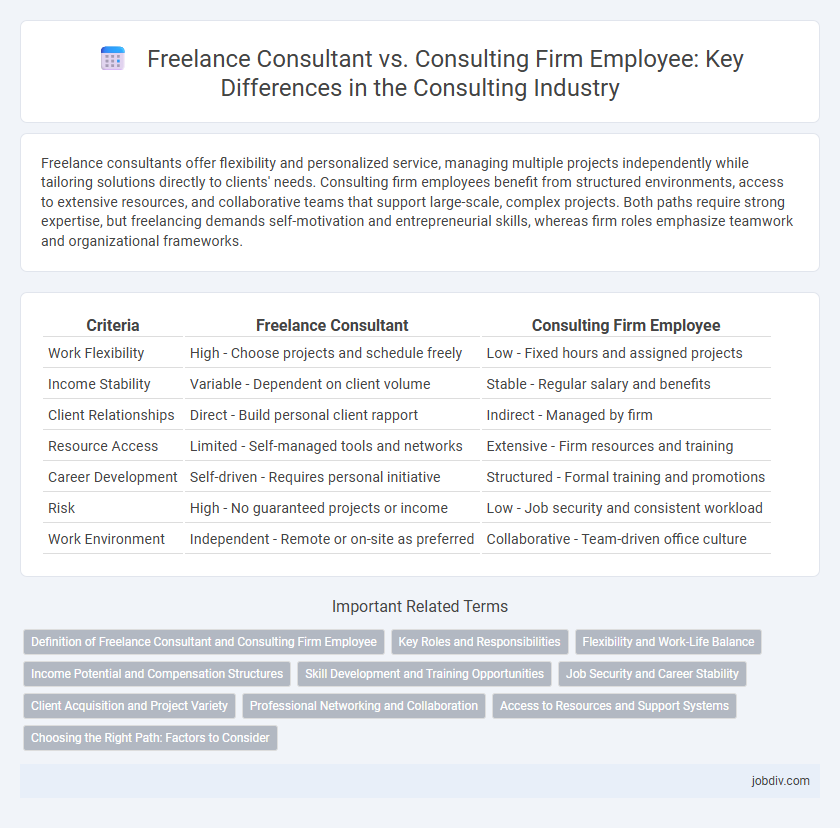Freelance consultants offer flexibility and personalized service, managing multiple projects independently while tailoring solutions directly to clients' needs. Consulting firm employees benefit from structured environments, access to extensive resources, and collaborative teams that support large-scale, complex projects. Both paths require strong expertise, but freelancing demands self-motivation and entrepreneurial skills, whereas firm roles emphasize teamwork and organizational frameworks.
Table of Comparison
| Criteria | Freelance Consultant | Consulting Firm Employee |
|---|---|---|
| Work Flexibility | High - Choose projects and schedule freely | Low - Fixed hours and assigned projects |
| Income Stability | Variable - Dependent on client volume | Stable - Regular salary and benefits |
| Client Relationships | Direct - Build personal client rapport | Indirect - Managed by firm |
| Resource Access | Limited - Self-managed tools and networks | Extensive - Firm resources and training |
| Career Development | Self-driven - Requires personal initiative | Structured - Formal training and promotions |
| Risk | High - No guaranteed projects or income | Low - Job security and consistent workload |
| Work Environment | Independent - Remote or on-site as preferred | Collaborative - Team-driven office culture |
Definition of Freelance Consultant and Consulting Firm Employee
A freelance consultant operates independently, offering specialized expertise to multiple clients on a project-by-project basis, often managing their own schedule and client relationships. In contrast, a consulting firm employee works as part of a structured organization, adhering to firm policies, collaborating with team members, and serving clients under the firm's brand and resources. The freelance consultant provides flexible, client-specific solutions, while the consulting firm employee benefits from organizational support, training, and a steady workflow.
Key Roles and Responsibilities
Freelance consultants manage end-to-end project delivery, offering specialized expertise and direct client interaction, ensuring tailored solutions and flexibility. Consulting firm employees often handle collaborative, multi-disciplinary projects within structured teams, focusing on broader organizational goals and adhering to firm methodologies. Both roles require strong analytical skills, problem-solving capabilities, and effective communication to drive business value and client satisfaction.
Flexibility and Work-Life Balance
Freelance consultants often enjoy greater flexibility in setting their schedules and choosing projects, leading to enhanced work-life balance compared to consulting firm employees. Consulting firm staff typically face structured hours, client-driven deadlines, and frequent travel, limiting personal time and adaptability. This dynamic makes freelancing attractive for professionals prioritizing autonomy and lifestyle control.
Income Potential and Compensation Structures
Freelance consultants typically enjoy flexible income potential driven by project diversity and hourly rates, often resulting in higher earnings per assignment compared to consulting firm employees who receive stable salaries with performance bonuses and benefits. Consulting firm employees benefit from structured compensation packages, including health insurance, retirement plans, and paid leave, offering financial security and predictable cash flow. Freelancers must manage variable income and self-employment taxes but can leverage niche expertise to command premium fees, while firm employees exchange top-end earning potential for consistent compensation and career advancement opportunities.
Skill Development and Training Opportunities
Freelance consultants often have greater control over selecting diverse projects that enhance specialized skill development and foster self-directed learning. Consulting firm employees benefit from structured training programs, mentorship, and access to company resources that accelerate professional growth in a collaborative environment. The choice between freelancing and firm employment significantly impacts access to continuous education and the pace of acquiring industry-specific expertise.
Job Security and Career Stability
Freelance consultants face variable income and job security due to project-based contracts, while consulting firm employees benefit from steady salaries and structured career progression. Consulting firms offer access to internal training, benefits, and long-term projects, enhancing career stability and professional growth. Freelancers gain flexibility and diverse experience but must actively manage client acquisition and market fluctuations to maintain consistent employment.
Client Acquisition and Project Variety
Freelance consultants often leverage personal networks and online platforms to directly acquire clients, enabling customized project selection that aligns with their expertise and interests. Consulting firm employees benefit from established brand reputation and dedicated business development teams, which streamline client acquisition but may limit project variety due to firm-assigned roles and sectors. Client acquisition strategies and the scope of project diversity significantly influence the career trajectory and skill development of both freelance consultants and consulting firm employees.
Professional Networking and Collaboration
Freelance consultants often build diverse professional networks by collaborating across various industries and projects, enabling flexible partnerships and rapid knowledge exchange. Consulting firm employees benefit from structured teamwork and access to established internal networks, fostering deep collaboration within specialized sectors. Both leverage different networking dynamics that significantly impact project outcomes and career growth opportunities.
Access to Resources and Support Systems
Freelance consultants often have limited access to extensive resources and support systems compared to consulting firm employees who benefit from established networks, proprietary tools, and administrative support. Consulting firms provide employees with continuous training programs, collaborative teams, and comprehensive databases that enhance problem-solving capabilities and project execution. In contrast, freelance consultants must proactively build their own resource networks and invest in personal development to maintain competitive service offerings.
Choosing the Right Path: Factors to Consider
Freelance consultants enjoy flexibility and control over project selection, which suits professionals seeking autonomy and varied experiences. Consulting firm employees benefit from structured career development, steadier income, and access to extensive resources and client networks. Key factors to consider include risk tolerance, desired work-life balance, income stability, and long-term career goals when choosing between freelancing and firm employment.
Freelance Consultant vs Consulting Firm Employee Infographic

 jobdiv.com
jobdiv.com